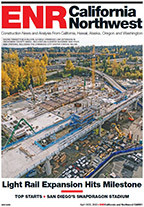The total project cost is $690 million, funded primarily by a 0.25% sales tax approved in 2008 by about 70% of the voters in Marin and Sonoma counties. Because the economic downturn generated less revenue than expected, the agency decided to build in phases, beginning with the initial 37 miles of the line. Along with some other decisions by the SMART team, this move has angered some voters, including the group RepealSMART, which is organizing to eliminate funding. As a countermeasure, others, such as the SMART Riders Coalition, are mounting rallies in support of the rail line.
Chris Snyder, district representative of Operating Engineers Local 3—based in Rohnert Park, one of the stops on SMART’s route—is also hoping the project continues as planned.
“We have been running at 20% to 30% unemployment for the past three years,” notes Snyder, adding, “SMART will create over 100 jobs [for] cranes, heavy equipment, surveyors and soil testers.”
At $10 million a mile, the project cost is cost-competitive with other rail and highway projects, Gamlen says. “It is an opportunity to influence how people get around the North Bay,” he says. “If you live in Petaluma and work in San Rafael, it will be a comfortable ride.”


Post a comment to this article
Report Abusive Comment